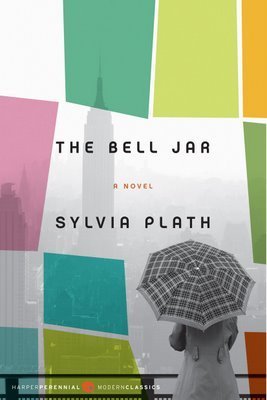 It was a queer, sultry, summer, the summer they electrocuted the Rosenbergs, and I didn't know what I was doing in New York.
It was a queer, sultry, summer, the summer they electrocuted the Rosenbergs, and I didn't know what I was doing in New York."The Bell Jar chronicles the crack-up of Esther Greenwood: brilliant, beautiful, enormously talented, and successful, but slowly going under--maybe for the last time. Sylvia Plath masterfully draws the reader into Esther's breakdown with such intensity that Esther's insanity becomes completely real and even rational, as probable and accessible an experience as going to the movies. Such deep penetration into the dark and harrowing corners of the psyche is an extraordinary accomplishment and has made The Bell Jar a haunting American classic."
Stupid Blogger deleted my review of The Bell Jar from a couple of weeks ago, so I now I have to type up my thoughts without having this excellent book fresh in my mind. Ah, Blogger, how I hate you. I'm considering switching to Wordpress entirely, but that's another story.
Anyway, I was reading The Bell Jar while on a trip to Costa Rica, and it was really, really good. The writing was very strange, but there was some beautiful language, and Esther's narrative was so cool and detached from all of it, from her slow descent into madness.
Oh, look, I wrote my original review down in a notebook. That's handy. Here it is: The Bell Jar was a good but really depressing book, as I knew it would be. I didn't love the writing with all of its fanciful descriptions, but I do think Plath's portrayal of the descent into madness is very compelling. It did seem a bit sudden though; at the beginning of the book Esther is fine, although there is some foreshadowing. Then all of a sudden she can't do anything, focus on anything, write anything.
Her main problem is that she sees all these different paths she could take, and the indecision drives her mad. The description of the fig tree was really chilling, of all the different branches one could take, and being stuck unable to take any of them.
And yet, I still didn't really understand her unraveling. After all, one doesn't have to commit to one career choice; If Esther didn't like one thing, she could try something else. She doesn't seem to have thought of that. But I think it's more than that, more than what career to take; she just doesn't know what to do with her life in general.
Esther annoyed me sometimes, but she was also so sad. At the beginning of the book she's rational, and in the middle she's contemplating suicide. And the end...I wasn't sure what to make of the end. I was expecting a different ending based on what actually happened to Sylvia Plath. I liked its ambivalence though.
The Bell Jar was intense and really good, although very depressing. Here's a quote that was really interesting, towards the beginning, which shows the reader that Esther definitely has mental problems. "I saw avocado pear after avocado pear being stuffed with crabmeat and mayonnaise and photographed under bright lights. I saw the delicate, pink-mottled claw meat poking seductively through its blanket of mayonnaise and the bland yellow pear cup with its rim of alligator green cradling the whole mess." (pg. 48). It's certainly a very disturbing description. Here's another funny quote: "I'd adored him from a distance for five years before he even looked at me, and then there was a beautiful time when I still adored him and he started looking at me, and then just as he was looking at me more and more I discovered quite by accident what an awful hypocrite he was, and now he wanted me to marry him and I hated his guts." (pg. 52). That was an amusing one. Anyway, I really liked The Bell Jar, and would recommend it.
213 pages.
Rating: ****
213 pages.
Rating: ****
No comments:
Post a Comment